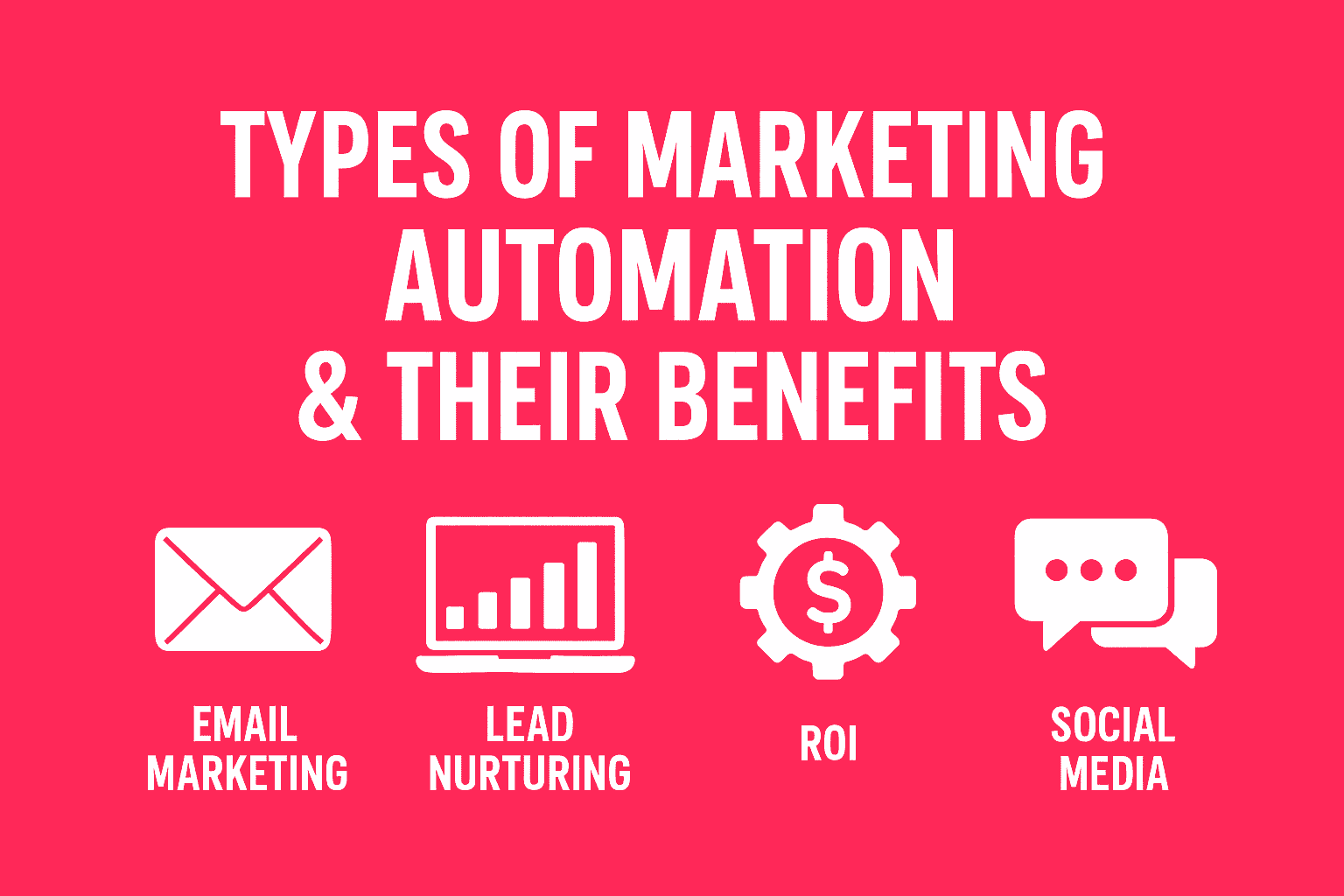Types of Marketing Automation & Their Benefits
In today’s fast-paced digital world, businesses are under pressure to connect with customers across multiple channels while delivering personalized experiences. But managing email campaigns, social media posts, lead nurturing, and reporting manually can quickly become overwhelming.
That’s where marketing automation comes in. By using software and AI-driven tools, companies can streamline repetitive tasks, nurture leads more effectively, and scale their efforts without losing the human touch.
In this guide, we’ll break down the 8 core types of marketing automation, their real benefits, emerging trends in the AI era, and how to choose the right platform. Whether you’re a startup, small business, or enterprise, marketing automation can help you save time, increase ROI, and build stronger customer relationships.
👉 Related: How Much Does Marketing Automation Actually Cost?
Why Marketing Automation Matters
At its core, marketing automation is about efficiency and personalization at scale. Instead of sending one-size-fits-all campaigns, businesses can use automation to deliver the right message to the right person at the right time.
How it helps businesses
- Saves time: Reduces manual, repetitive tasks.
- Scales campaigns: Enables consistent communication across thousands of leads.
- Improves customer experience: Personalizes content based on customer behavior.
- Boosts ROI: Aligns marketing and sales for better conversions.
According to Salesforce research, businesses that leverage marketing automation see a 451% increase in qualified leads.
8 Core Types of Marketing Automation (With Benefits & Examples)
1. Email Marketing Automation
- Benefits: Personalized campaigns, improved lead nurturing, reduced manual effort.
- Examples: Welcome sequences, abandoned cart reminders, re-engagement emails.
- Why it matters: Still the most cost-effective channel, email automation helps keep customers engaged throughout their journey.
2. Social Media Automation
- Benefits: Consistent posting, stronger engagement tracking.
- Examples: Pre-scheduled posts, automated replies, social listening alerts.
- Why it matters: Helps maintain an active brand presence 24/7 without burning out teams.
3. CRM Automation
- Benefits: Better lead management, improved customer data insights.
- Examples: Automated follow-ups, lead scoring, sales pipeline updates.
- Why it matters: Aligns sales and marketing to ensure no lead falls through the cracks.
4. Omnichannel Marketing Automation
- Benefits: Provides a seamless customer experience across touchpoints.
- Examples: Unified campaigns across email, SMS, chat, and social.
- Why it matters: Customers expect consistency no matter where they interact with your brand.
5. Content Marketing Automation
- Benefits: Faster distribution, improved targeting.
- Examples: Automated blog promotions, AI-powered content recommendations.
- Why it matters: Helps brands scale their content reach without constant manual posting.
6. Web Personalization Automation
- Benefits: Higher conversions, tailored customer journeys.
- Examples: Dynamic product recommendations, customized landing pages.
- Why it matters: Makes every website visit feel unique and relevant.
7. Analytics & Reporting Automation
- Benefits: Real-time insights, faster decision-making.
- Examples: Automated dashboards, campaign performance reports.
- Why it matters: Gives marketers the data they need without endless spreadsheet work.
8. Ad Campaign Automation
- Benefits: Improved ROI, smarter budget allocation.
- Examples: Programmatic ads, AI-driven bidding strategies.
- Why it matters: Optimizes ad spend and ensures campaigns reach the right audience.
Emerging Types of Marketing Automation in the AI Era
Mobile Marketing Automation
- Push notifications, SMS personalization.
- Reaches customers instantly on devices they use most.
Chatbot Automation
- Customer support, lead qualification, FAQs.
- Reduces response time and provides 24/7 assistance.
Data Analysis & AI-Powered Insights
- Predictive analytics, sentiment analysis.
- Helps businesses anticipate customer needs before they arise.
Real-World Examples of Marketing Automation
Lead Nurturing
Automated workflows that move prospects from awareness to conversion with targeted content.
Customer Onboarding
Step-by-step onboarding emails and tutorials to ensure customers get value quickly.
New Feature Adoption
Product updates and feature walkthroughs to increase engagement and retention.
How to Choose the Right Marketing Automation Platform
When selecting a tool, consider:
- Business size: Some tools are better for SMBs (e.g., Mailchimp), others for enterprises (e.g., HubSpot, Marketo).
- Goals: Do you want to focus on lead nurturing, social, or omnichannel campaigns?
- Integrations: Ensure compatibility with your CRM, CMS, and analytics.
- Scalability: Pick a platform that grows with your business needs.
👉 Related Resource: Folotek Marketing Solutions
Key Takeaways
- Marketing automation saves time, scales campaigns, and personalizes customer experiences.
- There are 8 main types, from email automation to AI-driven ads.
- AI and mobile-first strategies are shaping the future of automation.
- Choosing the right platform depends on your business size, goals, and integrations.
Next Steps
Evaluate your marketing goals, choose the automation type that fits best, and start small before scaling.
Frequently Asked Questions (FAQs)
What is marketing automation and examples?
Marketing automation uses software to automate repetitive tasks like email campaigns, social media posting, and lead nurturing.
Example: A welcome email series triggered when a customer signs up.
What are the four types of marketing with examples?
Product, price, place, and promotion. For example, promotion may include automated email campaigns.
What is the most popular marketing automation platform?
HubSpot, ActiveCampaign, and Mailchimp are among the most widely used.
Is Canva a marketing automation tool?
No, Canva is a design tool. However, it integrates with automation platforms for easier content distribution.
What are the four types of automation?
- Marketing automation
- Sales automation
- Service automation
- Process automation
Is marketing automation an AI?
Not entirely. Marketing automation uses workflows and triggers, while AI enhances automation with predictive analytics and smarter personalization.
Conclusion
Marketing automation is no longer optional — it’s essential for businesses that want to save time, increase ROI, and deliver exceptional customer experiences. From email campaigns to AI-driven ad optimization, the possibilities are endless.
If you’re ready to grow smarter, explore tools that match your goals, test small workflows, and scale gradually.
👉 Explore more strategies at Folotek.com.

